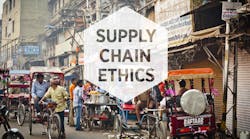Companies Must Get Better at Monitoring Ethics in their Supply Chains
Supply chains must step up to their responsibility to ensure proper ethics, according to a new survey released by the Economist entitled “No More Excuses – Responsible Supply Chain in a Globalized World.”
Part of the issue is that as the supply chain continually expands globally, it has become more complex. Developing countries now have underdeveloped countries in their supply chain.
“The integration of developing-country producers into supply chains is having a transformative effect on local economies, allowing poor countries to develop,” wrote Richard M Locke, provost and professor of political science and international and public affairs, Brown University in the foreward to the report.
Locke explains further.
At the same time, however, the social and environmental consequences of this particular pattern of development have provoked significant controversies over the role of global brands and their local suppliers, often seen as exploiting developing countries’ low wages and weak social and environmental regulations to produce low-cost goods at the expense of local workers’ welfare. Child labor, hazardous working conditions, excessive working hours and poor wages plague many workplaces in the developing world, creating embarrassment for the global companies that source from these factories and farms.
The report lays out the following challenges the supply chain faces and offers some recommendations.
Challenges
1) Complacency is evident and progress has stalled in some economies. Four in five respondents described their firms as having responsible supply chains, yet under a quarter addressed some of the key issues such as climate change or child labor. While a small majority of firms had made supply chain responsibility a higher priority in the last five years, a full 30% had decreased their focus on this over the same period. In some economies, progress had stalled.
2) Issues for which the impacts are harder to measure or forecast are not as well addressed. Issues for which it was relatively straightforward to demonstrate quantifiable short-term risks and benefits/opportunities received more attention from firms than less tangible or longer-term issues. For instance, firms were more likely to address health and safety risks (illustrated in disasters such as the Rana Plaza factory collapse) and recycling (which can generate revenue) than climate change.
3) Issues that only affect a sub-set of the population are falling through the gaps. For instance, issues which disproportionately affect women and children appear to be side-lined compared to general labor issues. This could be a result of prioritization methods used by firms to direct the focus of responsible supply chain efforts, achieving maximum overall impact but missing certain groups.
4) Financial stakeholders are missing opportunities to positively influence supply chain responsibility. Just 27% of executives cited banks or financial institutions as a key influence on their responsible supply chain policy, and just 20% cited stock exchanges. Yet interviews revealed that financial stakeholders have a good deal of potential to support, incentivize or hamper responsible conduct.
5) Some suppliers are less subject to positive influences. For instance, a) where a supplier is too small or anonymous to face much reputational risk, and is not subject to pressure from business customers, financial institutions or consumers (for example, a small or medium-sized enterprise [SME] in a developing country which is not listed and only supplies local firms), and b) when a supplier is so large that the brands buying its products have limited influence over it.
6) Supply chain complexity is the number one hurdle to responsibility, cited by 49% of executives. Most companies have a long way to go in tackling this challenge, with a majority enforcing their responsible supply chain standards among direct suppliers only—leaving themselves open to risks further down the chain.
Recommendations:
- Progress on ensuring firms prioritize responsible supply chain risks is driven by soft and hard regulations. Momentum of multilateral initiatives and domestic regulations must be maintained to avoid a slide-back.
- Brands and other large buyers hold significant influence over their supply chains and should do more to exert this influence.
- Prioritzation systems should take into account the seriousness of an issue as well as how widespread its impact is.
- Financial institutions can play a role in providing targeted incentives for inclusion of groups facing discrimination, and this can be commercially beneficial rather than altruistic. For instance, women and minority groups face discrimination in access to finance in many areas, and supplier finance programs in partnership with buyers can drive financial inclusion while growing business for the financial institution or bank.
- Government regulation is especially important where suppliers are not subject to much influence from business customers, consumers or civil society watchdogs. Regulators should set and enforce an acceptable baseline to cover the firms which fall through the gaps.
- In jurisdictions where regulatory or enforcement capacity is limited, as in many emerging markets, the most effective temporary measure may be to develop the positive business case for responsible conduct, presenting the issue as an opportunity for individual businesses as well as the local economy.
- Where the supplier is bigger than the brands buying from it, cooperation among competitor brands on setting acceptable standards is one means of redressing the balance of power.
- Reducing the supplier base, where feasible, simplifies the problem. As well as reducing the burden of risk assessment and monitoring, it enables firms to know their suppliers better and engage more closely with them on raising standards.



